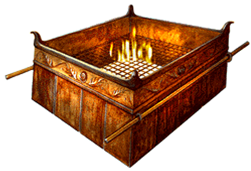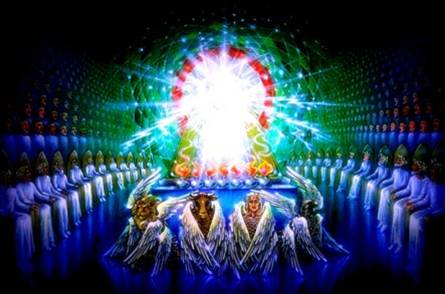Angelic Conflict part 87: Angelology 102; Basic facts – Isa 6:1-8; Rev 4:1-11.
length: 62:58 - taught on May, 29 2013
Class Outline:
Title: Angelic Conflict part 87: Angelology 102; Basic facts - ISA 6:1-8; REV 4:1-11.
Seraphim(pl)seraph(s) are referred to only once in Isa 6.
Seraphim: meaning - “burning ones.” They have six wings, stand above the throne, and they speak in order to give glory to the Lord. Mentioned only once in ISA 6:1-8.
These angelic creatures are mentioned but once in the Bible as found in ISA 6:1-8.
Background:
For young Isaiah, the outlook was bleak. His beloved King had died, his nation was in peril, and he could do very little about it. The outlook may have been bleak, but the uplook was glorious! God was still on the throne and reigning as the Sovereign of the universe! From heaven's point of view, "the whole earth" was "full of His glory"
ISA 6:1 In the year of King, Uzziah's death, I saw the Lord sitting on a throne, lofty and exalted, with the train of His robe filling the temple.
This is a vision of the heavenly temple as opposed to the heavenly chariot throne that Ezekiel saw.
ISA 6:2 Seraphim stood above Him, each having six wings; with two he covered his face, and with two he covered his feet, and with two he flew.
Standing above Him cannot mean superior to Him. They cover their faces in the presence of His awesome glory and they cover their feet in acknowledgment of how low they are in respect to Him.
They praise the person of God.
ISA 6:3 And one called out to another and said,
"Holy, Holy, Holy, is the Lord of hosts,,
The whole earth is full of His glory."
The repetition of the word “holy” emphasizes the superlative degree of God’s holiness and is likely also a reference to the Trinity.
The whole earth is full of His glory and the believer must train the senses of his soul to see God’s glory in everything through his intake of doctrine.
ISA 6:4 And the foundations of the thresholds trembled at the voice of him who called out, while the temple was filling with smoke [most likely the cloud that often represents God’s glory].
For an obvious reason Isaiah doesn’t respond as the seraphim do.
ISA 6:5 Then I said,
"Woe is me, for I am ruined!,
Because I am a man of unclean lips,
And I live among a people of unclean lips;,
For my eyes have seen the King, the Lord of hosts."
The sight of the holy God and the sound of the holy hymn makes Isaiah immediately introspective and he realizes that he is a man of unclean lips as is the nation.
The seraphim don’t react this way, but Isaiah is a sinner saved by grace and he is going to have to be clearly reminded of that fact. Yet he does now at this time that he has unclean lips and that is always the result of an unclean heart.
Unclean lips are the result of an unclean heart:
"You brood of vipers, how can you, being evil, speak what is good? For the mouth speaks out of that which fills the heart.
It is a mark of humility to recognize that you have an unclean heart but a mark of ignorance if that leads to a lack of confidence before God. Loss of confidence nullifies any humility. The “oh me oh my” routine is the same as the self-pity routine; they are both subtle forms of arrogance because they lack faith in the finished work.
And neither the Lord nor the angels refute that point. He is unclean but God has made him clean through the future work of Christ.
In his admission Isaiah is inwardly crying out to be cleansed and God is going to meet that need.
ISA 6:6 Then one of the seraphim flew to me, with a burning coal in his hand which he had taken from the altar with tongs.
The seraphim assisted in teaching the doctrine of propitiation to Isaiah.
If this were on earth that burning coal would have come from the brazen altar where animal blood is shed and burned. So we have a combination of fire (judgment) and blood (atonement).
.jpg)

ISA 6:7 And he touched my mouth with it and said, "Behold, this has touched your lips; and your iniquity is taken away, and your sin is forgiven."
Before we can minister to others we must let God minister to us. Through the work of Christ and the surpassing grace it brings we must become genuinely humble.
who comforts us in all our affliction so that we may be able to comfort those who are in any affliction with the comfort with which we ourselves are comforted by God.
Isaiah’s conviction led to an acknowledgement of uncleanliness before God, worthlessness, undeservedness, and because of Christ this resulted in genuine humility rather than low self-esteem and self-pity.
The sacrifices of God are a broken spirit;
A broken and a contrite heart, O God, Thou wilt not despise.
All the great heroes of the Bible realized and accepted this attitude:
Abraham: GEN 18:27
And Abraham answered and said, "Now behold, I have ventured to speak to the Lord, although I am but dust and ashes.
Jacob: GEN 32:10
I am unworthy of all the lovingkindness and of all the faithfulness which Thou hast shown to Thy servant; for with my staff only I crossed this Jordan, and now I have become two companies.
Job: JOB 40:3-4
Then Job answered the Lord and said,
"Behold, I am insignificant; what can I reply to Thee?
I lay my hand on my mouth.
David: 2SA 7:18
Then David the king went in and sat before the Lord, and he said, "Who am I, O Lord God, and what is my house, that Thou hast brought me this far?
Paul: 1TI 1:15
It is a trustworthy statement, deserving full acceptance, that Christ Jesus came into the world to save sinners, among whom I am foremost of all.
Peter: Luke 5:8
But when Simon Peter saw that, he fell down at Jesus' feet, saying, "Depart from me, for I am a sinful man, O Lord!"
Notice that all of these were humbled before the Lord and not before people. Anyone can make a good showing of humility or unworthiness before people but that means nothing. It is only before God that this attitude bears the fruits of spiritual self esteem.
Once Isaiah recognizes clearly that he is forgiven through the work of the Savior his attitude changes completely from self-pity to confidence.
ISA 6:8 Then I heard the voice of the Lord, saying, "Whom shall I send, and who will go for Us?" Then I said, "Here am I. Send me!"
The living creatures: The living creatures is a title which represents these angels as manifesting the fullness of divine life, unceasing activity, and abiding participation in the worship of God.
Some think they are cherubim and others think they are seraphim and the scripture doesn’t tell us they are either one, therefore it is not significant.

A little background (vs. 1-4) would clarify this picture for you, for just as we have seen with the cherubim and seraphim, the limited knowledge about these angels serve us a wealth of understanding of our humility, obedience, and praise of God’s glory as beholding Him in utmost awe, who alone is worthy, who alone is worshipped and who name alone is exalted. When John first glimpses the throne of God that is what is impressed upon him.
REV 4:1 After these things I looked, and behold, a door standing open in heaven [third heaven; beyond all telescopes], and the first voice which I had heard, like the sound of a trumpet speaking with me, said, "Come up here, and I will show you what must take place after these things."
John is still in his body on the island of Patmos while experiencing, in the Spirit, being in the presence of God and seeing these glorious visions.
REV 4:2 Immediately I was in the Spirit; and behold, a throne was standing in heaven, and One sitting on the throne.
John becomes one of the few to see this before exiting the earth and so is in the company of Isaiah, Daniel, Ezekiel, Moses and the 70 elders.
REV 4:3 And He who was sitting was like a jasper stone and a sardius in appearance; and there was a rainbow around the throne, like an emerald in appearance.
The precious stones mentioned also seem to have meaning. The jasper stone is described in chapter 21 as a precious stone which is clear like crystal, which would seem to indicate that it may be what we would call a diamond. The sardine stone, or the sardius, is a familiar stone in color like a ruby, a beautiful red.
We have seen 9 precious stones in Eze 28 covering the unfallen Lucifer, at the foot of the throne on Mt. Sinai and in Ezekiel’s vision in Eze 10 we see that it was made of sapphire.





